How can I help you?
Data Labels in Xamarin.Forms Maps (SfMaps)
8 Jan 202518 minutes to read
Data labels are used to display the values of shapes.
Adding data labels
The ShowMapItems property, which is a boolean property, displays or hides the data labels in shapes. Set the ShapeValuePath property to get the data labels bound to each shape.
<ContentPage.BindingContext>
<local:USAStateViewModel/>
</ContentPage.BindingContext>
<maps:SfMaps x:Name="sfmap" >
<maps:SfMaps.Layers>
<maps:ShapeFileLayer Uri="usa_state.shp" ShowMapItems="True" ItemsSource="{Binding DataSource}" ShapeIDPath="Name" ShapeIDTableField="STATE_NAME">
<maps:ShapeFileLayer.ShapeSettings>
<maps:ShapeSetting ShapeValuePath="Type" ShapeFill="LightGray"/>
</maps:ShapeFileLayer.ShapeSettings>
</maps:ShapeFileLayer>
</maps:SfMaps.Layers>
</maps:SfMaps>SfMaps map = new SfMaps();
ShapeFileLayer layer = new ShapeFileLayer();
layer.Uri = "usa_state.shp";
layer.ShowMapItems = true;
layer.ShapeSettings.ShapeFill = Color.LightGray;
USAStateViewModel usaStateViewModel = new USAStateViewModel();
layer.ItemsSource = usaStateViewModel.DataSource;
layer.ShapeIDPath = "Name";
layer.ShapeIDTableField = "STATE_NAME";
layer.ShapeSettings.ShapeValuePath = "Type";
map.Layers.Add(layer);
this.Content = map;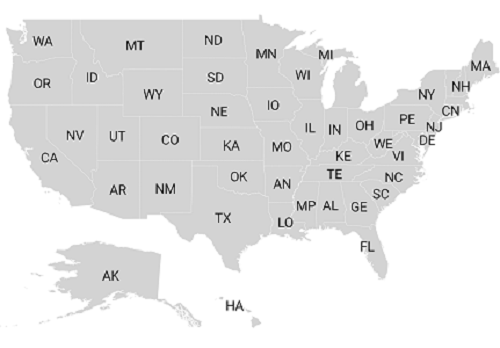
Setting contrast color
Based on the background color of the shapes, contrast color will be applied to data labels.
<maps:SfMaps x:Name="sfmap">
<maps:SfMaps.Layers>
<maps:ShapeFileLayer Uri="usa_state.shp" ShowMapItems="True" ItemsSource="{Binding DataSource}" ShapeIDPath="Name" ShapeIDTableField="STATE_NAME">
<maps:ShapeFileLayer.ShapeSettings>
<maps:ShapeSetting ShapeFill="#A9D9F7" ShapeValuePath="Type" ShapeColorValuePath="index" >
<maps:ShapeSetting.ColorMappings>
<maps:RangeColorMapping To="25" From="0" Color="#FFD84F"/>
<maps:RangeColorMapping To="50" From="25" Color="#316DB5"/>
</maps:ShapeSetting.ColorMappings>
</maps:ShapeSetting>
</maps:ShapeFileLayer.ShapeSettings>
<maps:ShapeFileLayer.DataLabelSettings>
<maps:DataLabelSetting SmartLabelMode="Trim"/>
</maps:ShapeFileLayer.DataLabelSettings>
</maps:ShapeFileLayer>
</maps:SfMaps.Layers>
</maps:SfMaps>SfMaps map = new SfMaps();
ShapeFileLayer layer = new ShapeFileLayer();
layer.Uri = "usa_state.shp";
layer.ShowMapItems = true;
layer.ShapeSettings.ShapeFill = Color.DarkBlue;
USAStateViewModel usaStateViewModel = new USAStateViewModel();
layer.ItemsSource = usaStateViewModel.DataSource;
layer.ShapeIDPath = "Name";
layer.ShapeIDTableField = "STATE_NAME";
layer.ShapeSettings.ShapeValuePath = "Type";
layer.ShapeSettings.ShapeColorValuePath = "index";
ObservableCollection<ColorMapping> colorMapping = new ObservableCollection<ColorMapping>();
RangeColorMapping rangeColorMapping = new RangeColorMapping();
rangeColorMapping.From = 0;
rangeColorMapping.To = 25;
rangeColorMapping.Color = Color.FromHex("#FFD84F");
colorMapping.Add(rangeColorMapping);
RangeColorMapping rangeColorMapping1 = new RangeColorMapping();
rangeColorMapping1.From = 25;
rangeColorMapping1.To = 50;
rangeColorMapping1.Color = Color.FromHex("#316DB5");
colorMapping.Add(rangeColorMapping1);
layer.ShapeSettings.ColorMappings = colorMapping;
DataLabelSetting dataLabelSetting = new DataLabelSetting();
dataLabelSetting.SmartLabelMode = IntersectAction.Trim;
layer.DataLabelSettings = dataLabelSetting;
map.Layers.Add(layer);
this.Content = map;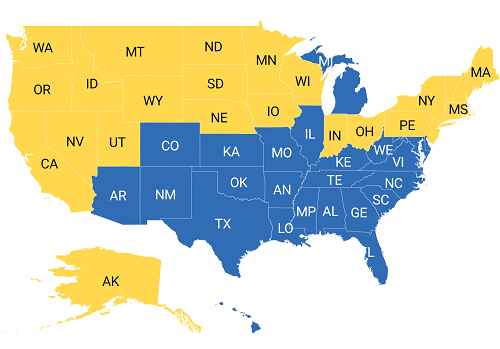
Customizing data labels
Data labels can be customized using the DataLabelSetting property in shape file layer. The font attribute, color, font size, and font family can be customized using the FontAttributes, TextColor, FontSize, and FontFamily properties.
<maps:SfMaps x:Name="sfmap" >
<maps:SfMaps.Layers>
<maps:ShapeFileLayer Uri="usa_state.shp" ShowMapItems="True" ItemsSource="{Binding DataSource}" ShapeIDPath="Name" ShapeIDTableField="STATE_NAME">
<maps:ShapeFileLayer.ShapeSettings>
<maps:ShapeSetting ShapeValuePath="Type" ShapeFill="LightGray"/>
</maps:ShapeFileLayer.ShapeSettings>
<maps:ShapeFileLayer.DataLabelSettings>
<maps:DataLabelSetting TextColor="Blue" FontAttributes="Bold" FontFamily="cursive" FontSize="12" />
</maps:ShapeFileLayer.DataLabelSettings>
</maps:ShapeFileLayer>
</maps:SfMaps.Layers>
</maps:SfMaps>SfMaps map = new SfMaps();
ShapeFileLayer layer = new ShapeFileLayer();
layer.Uri = "usa_state.shp";
layer.ShowMapItems = true;
USAStateViewModel usaStateViewModel = new USAStateViewModel();
layer.ItemsSource = usaStateViewModel.DataSource;
layer.ShapeIDPath = "Name";
layer.ShapeIDTableField = "STATE_NAME";
layer.ShapeSettings.ShapeValuePath = "Type";
layer.ShapeSettings.ShapeFill = Color.LightGray;
DataLabelSetting dataLabelSetting = new DataLabelSetting();
dataLabelSetting.TextColor = Color.Blue;
dataLabelSetting.FontAttributes = FontAttributes.Bold;
dataLabelSetting.FontFamily = "cursive";
dataLabelSetting.FontSize = 12;
layer.DataLabelSettings = dataLabelSetting;
map.Layers.Add(layer);
this.Content = map;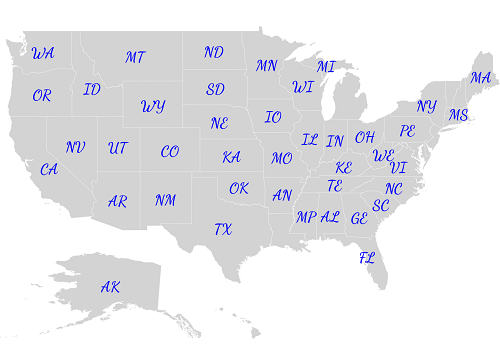
To smartly align data labels
The SmartLabelMode property aligns the labels smartly within shape boundaries and avoids labels overlapping. Labels can be customized using the Hide, Trim, and None options.
<maps:SfMaps x:Name="sfmap">
<maps:SfMaps.Layers>
<maps:ShapeFileLayer Uri="usa_state.shp" ShowMapItems="True" ItemsSource="{Binding Data}" ShapeIDPath="State" ShapeIDTableField="STATE_NAME">
<maps:ShapeFileLayer.ShapeSettings>
<maps:ShapeSetting ShapeValuePath="State" ShapeFill="LightGray" />
</maps:ShapeFileLayer.ShapeSettings>
<maps:ShapeFileLayer.DataLabelSettings>
<maps:DataLabelSetting SmartLabelMode="Trim"/>
</maps:ShapeFileLayer.DataLabelSettings>
</maps:ShapeFileLayer>
</maps:SfMaps.Layers>
</maps:SfMaps>SfMaps map = new SfMaps();
ShapeFileLayer layer = new ShapeFileLayer();
layer.Uri = "usa_state.shp";
layer.ShowMapItems = true;
USAStateViewModel usaStateViewModel = new USAStateViewModel();
layer.ItemsSource = usaStateViewModel.Data;
layer.ShapeIDPath = "State";
layer.ShapeIDTableField = "STATE_NAME";
layer.ShapeSettings.ShapeValuePath = "State";
layer.ShapeSettings.ShapeFill = Color.LightGray;
DataLabelSetting dataLabelSetting = new DataLabelSetting();
dataLabelSetting.SmartLabelMode = IntersectAction.Trim;
layer.DataLabelSettings = dataLabelSetting;
map.Layers.Add(layer);
this.Content = map;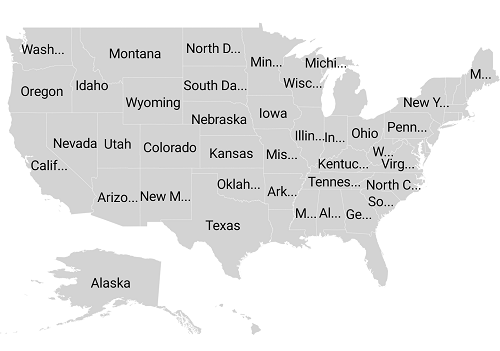
To avoid overlap in data labels
The IntersectionAction property aligns labels that overlap. Labels can be customized using the Hide, Trim, and None options. First, set the SmartLabelMode property to None.
<maps:SfMaps x:Name="sfmap">
<maps:SfMaps.Layers>
<maps:ShapeFileLayer Uri="usa_state.shp" ShowMapItems="True" ItemsSource="{Binding Data}" ShapeIDPath="State" ShapeIDTableField="STATE_NAME">
<maps:ShapeFileLayer.ShapeSettings>
<maps:ShapeSetting ShapeValuePath="State" ShapeFill="LightGray" />
</maps:ShapeFileLayer.ShapeSettings>
<maps:ShapeFileLayer.DataLabelSettings>
<maps:DataLabelSetting IntersectionAction="Hide" SmartLabelMode="None"/>
</maps:ShapeFileLayer.DataLabelSettings>
</maps:ShapeFileLayer>
</maps:SfMaps.Layers>
</maps:SfMaps>SfMaps map = new SfMaps();
ShapeFileLayer layer = new ShapeFileLayer();
layer.Uri = "usa_state.shp";
layer.ShowMapItems = true;
USAStateViewModel usaStateViewModel = new USAStateViewModel();
layer.ItemsSource = usaStateViewModel.Data;
layer.ShapeIDPath = "State";
layer.ShapeIDTableField = "STATE_NAME";
layer.ShapeSettings.ShapeValuePath = "State";
layer.ShapeSettings.ShapeFill = Color.LightGray;
DataLabelSetting dataLabelSetting = new DataLabelSetting();
dataLabelSetting.IntersectionAction = IntersectAction.Hide;
dataLabelSetting.SmartLabelMode = IntersectAction.None;
layer.DataLabelSettings = dataLabelSetting;
map.Layers.Add(layer);
this.Content = map;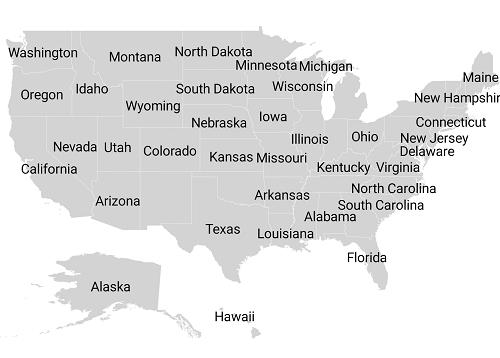
NOTE
You can refer to our Xamarin Maps feature tour page for its groundbreaking feature representations. You can also explore our Xamarin.Forms Maps example to knows the functionalities of each feature.